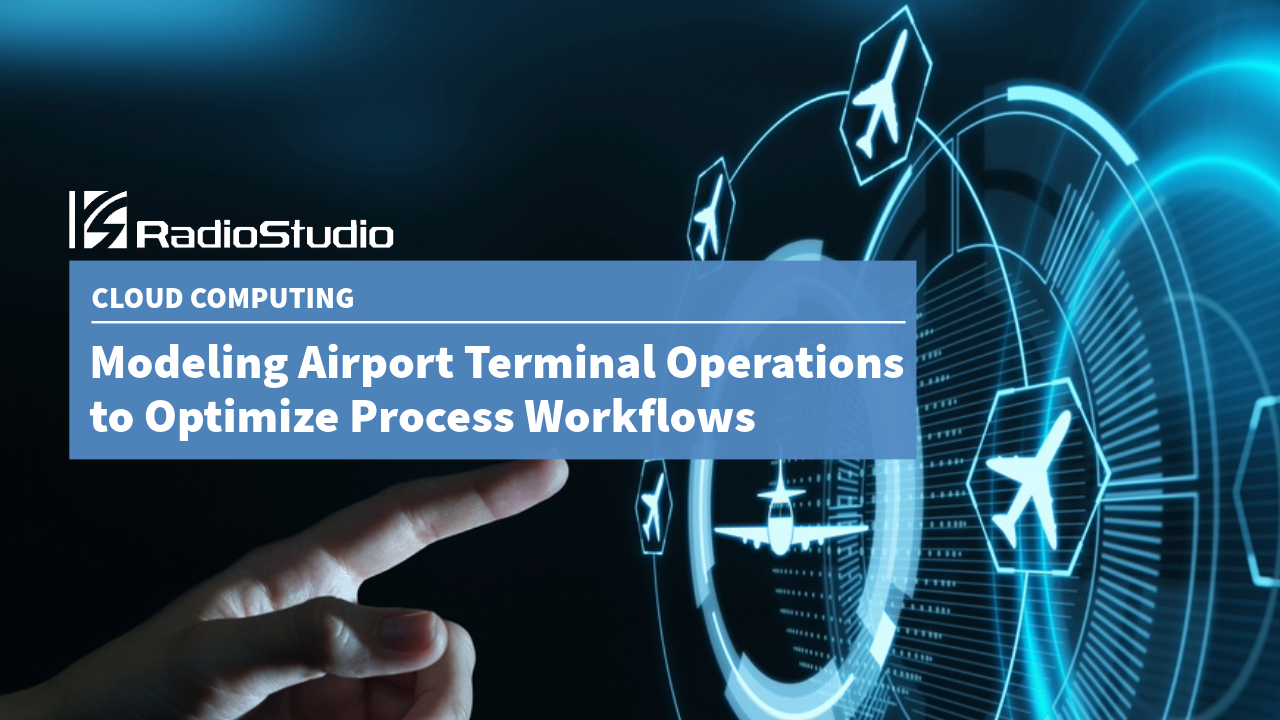Airport terminal operations can get very complex with frequent capacity challenges, queue management, and resource allocation. A digital twin replicates and analyzes various aspects of terminal operations and integrates with real-world systems to help stakeholders understand the behavior of different components within the terminal, optimize resources, improve passenger flow, and enhance overall efficiency and safety. Here is how airport authorities can leverage Simio, a unique multi-paradigm modeling tool for modeling airport terminal operations.
This post was originally published in Simio.
Use Case: Modeling Airport Terminal Operations

Problem Statement
Predicting the performance of dynamic, complex process workflows involving multiple users in a public place is always challenging. Take the case of airport terminal operations. There are so many interconnected workflows spanning passenger check-in, baggage handling, and airside operations. Without a technological intervention, there is absolutely no way to understand and quantify the consequences of user actions and unexpected events.

Realization Approach
A digital twin software of an airport operations system, with a drag and drop interface, offers a customizable model to study and answer tough questions about various performance aspects of the process workflows. With augmented 3D technology for immersive visual experience and connections to real-world systems, operations teams can test their ideas to optimize the workflows digitally before implementing them in the physical arena within the airport.

Solution Space
With this approach, airport authorities can significantly expedite the deployment time for new process improvement ideas at minimal cost while also monitoring the in-process performance of the deployed workflows to gain data-driven insights for the evaluation of future capacity planning and optimization needs.
Simio is a unique multi-paradigm modeling tool that combines the simplicity of objects with the flexibility of processes to provide a rapid modeling capability without requiring programming.
Simio can be used to predict and improve the performance of dynamic, complex systems in passenger processing, airside operations, ground transportation, baggage handling, logistics, lean-six-sigma and other disciplines.
Feature Summary for Modeling Airport Terminal Operations
What if you were able to test your terminal expansion plans and identify their weaknesses early in their development phase. Wouldn’t you improve them? What if you had an efficient way to define and visualize your whole system: facilities, equipment, people, flights and processes? Wouldn’t you check your ideas to make sure that it all made sense with optimal resource mix and good return on investment?
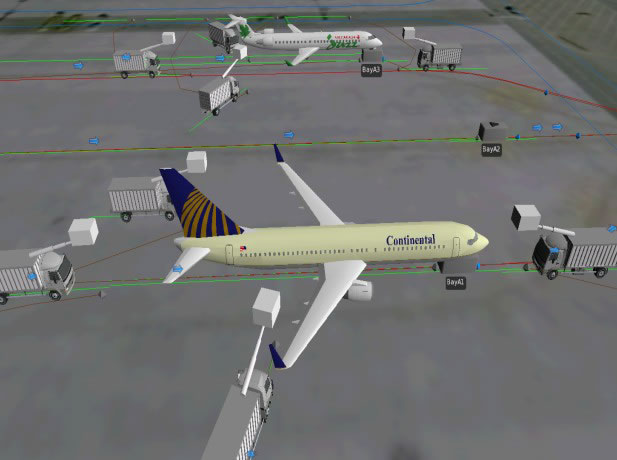
Simio comes to rescue through advanced animations, charts and statistics for modeling airport terminal operations. It enables operations teams to define ideas, quantify their performance, and refine further. All of this is achieved with simplicity, safely, and without risks.
Accurate 3D Models For Airport Processes
Simio’s straightforward drag-and-drop interface allows users to create models quickly and easily — giving new users a glimpse into the future of their designs. Simio’s simulation capabilities allows superior flexibility and the ability to quickly model your system without compromise. It follows a rapid modeling approach without programming that aligns with the speed of business.
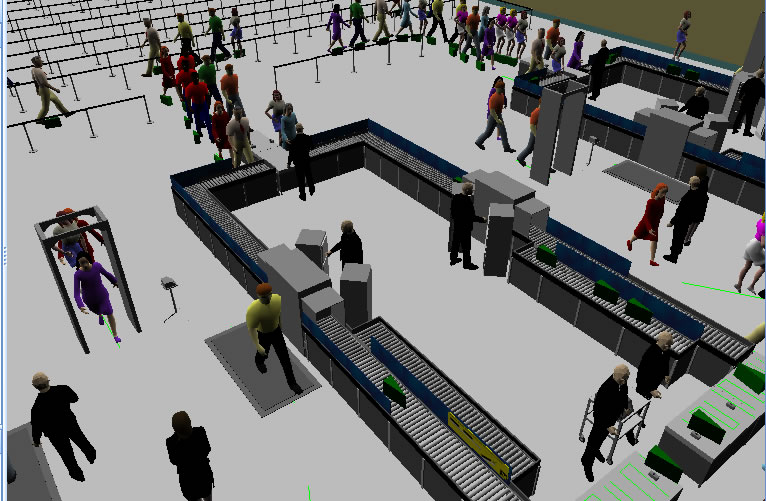
Simio provides the means to visualize the contributions of each member of the airport value chain whether they be airline, airport authority, government agency or service provider.
Modeling Airport Terminal Operations to Answer Tough Questions
With advanced techniques for modeling airport terminal operations, Simio can answer tough questions both inside and outside airport terminals, such as:
- How to increase increase runway capacity?
- How to deploy human resource to minimize cost while maintaining service levels?
- How to make the most of limited queuing space?
- Will the central conveyor system be able to handle the bags destined to the new gates?
- What will be the impact of the taxiway on aircraft turnaround times?
- At what frequency should the shuttles run between terminals?
- What will be the wait time at security on Monday mornings?
- How to expand the parking lot?
- How should the operations be transferred to the new terminal?
… and more.
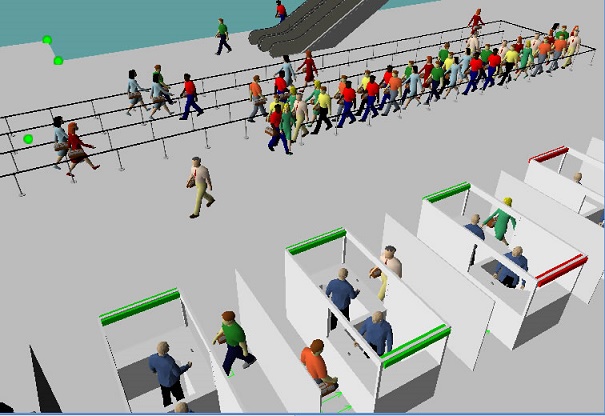
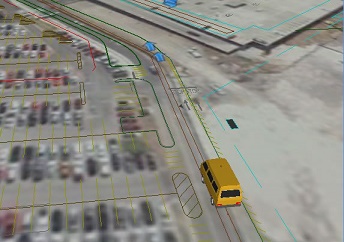
Simio is used by airlines, aircraft manufacturers, government agencies, airport authorities and engineering consultancies to visualize, quantify, understand and predict the consequences of their actions.
Key Features of Simio
- Multipurpose models for groundside, terminal and airside systems within a consistent modeling environment.
- Building models using intuitive feature rich objects and adding custom behaviors or create new objects graphically without coding.
- Flexible and easy to use data management environment to define, organize, link and exploit schedules, process times, equipment definitions and business rules.
- Intelligent network to enable the efficient modeling of people, aircraft, baggage and equipment movements within the entire facility.
- Advanced optimization and analysis tools to discover and unlock hidden value throughout the system.

The Simio Advantage
- Lower total cost of ownership to deliver faster results with less investment in time and money.
- Integrated 3D technology to provide an immersive visual experience.
- Advanced interface and extensible objects to easily learn and accelerate the modeling process.

To know more about Simio’s capabilities, check out the product portfolio.

